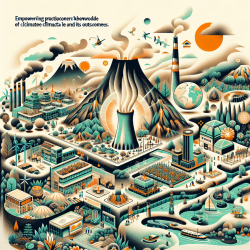The global push towards renewable energy has never been more critical. With climate change posing significant threats, understanding the effectiveness of climate finance is crucial for practitioners in the field of renewable energy development. The research article "Climate Finance Effectiveness: A Comparative Analysis of Geothermal Development in Indonesia and the Philippines" offers valuable insights into how climate finance can address barriers to geothermal development. This blog post aims to help practitioners enhance their skills by implementing these insights or encouraging further research.
Understanding Climate Finance Mechanisms
The research identifies three key mechanisms through which climate finance impacts geothermal development: utility modifier, social learning, and capacity building. These mechanisms interact with financial, regulatory, and technical barriers but require political will and responsiveness to energy shocks to be truly effective.
- Utility Modifier: This mechanism involves project development finance that alters the cost-benefit analysis for stakeholders. It encourages private investment by reducing financial risks through economic incentives.
- Social Learning: Facilitates behavior change by introducing new information and discourses. International forums and policy advising help promote alternative policies or technologies.
- Capacity Building: Focuses on technical assistance and training to build institutional capacity. This ensures effective implementation of reforms and develops a skilled workforce for geothermal projects.
Lessons from Indonesia and the Philippines
The comparative analysis of geothermal development in Indonesia and the Philippines provides empirical data on how these mechanisms work in practice.
Indonesia
Indonesia has vast geothermal reserves but has developed only a fraction of its potential due to financial, regulatory, and technical barriers. The introduction of innovative financing tools like the Geothermal Resource Risk Mitigation Project (GREM) aims to reduce exploration risks. Capacity building efforts have focused on enhancing local technical expertise through training programs.
The Philippines
The Philippines has successfully developed a significant portion of its geothermal potential but faces challenges with remaining resources. Financial barriers persist due to high costs associated with lower-quality resources. The country has benefited from international technical assistance, which has helped build local expertise over time.
Implementing Insights for Practitioners
Practitioners can leverage these insights by focusing on integrated approaches that combine financial aid with policy advising and capacity building. Understanding the local political landscape and potential energy shocks is crucial for designing effective interventions.
Encouraging further research into specific barriers within different contexts will also enhance the effectiveness of climate finance initiatives. By fostering collaboration between international organizations, domestic actors, and local communities, practitioners can drive sustainable energy solutions.
To read the original research paper, please follow this link: Climate Finance Effectiveness: A Comparative Analysis of Geothermal Development in Indonesia and the Philippines.










